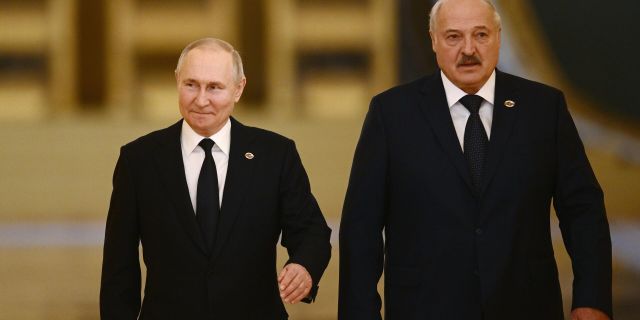Andrey Bystritsky, Chairman of the Board of the Foundation for Development and Support of the Valdai International Discussion Club, believes that the presidents of Russia and Belarus warned Western countries against escalation
MOSCOW, July 23. /tass/. The Presidents of Russia and Belarus, Vladimir Putin and Alexander Lukashenko, at a meeting in St. Petersburg, sent a signal to the West warning against further escalation of the Ukrainian conflict before the meeting of the Ukraine-NATO Council. This opinion was expressed on Sunday in an interview with TASS by Andrey Bystritsky, chairman of the Board of the Foundation for the Development and Support of the Valdai International Discussion Club.
"I think that the statements made at the meeting between Putin and Lukashenko are connected, among other things, with the fact that on July 26, representatives of Ukraine are going to meet with NATO members about the latest developments. This is a warning signal ahead of this meeting. The message is to keep the conflict within the framework," the agency interlocutor said.
He stressed that the risks of further aggravation around Ukraine have increased recently. "This is due to Kiev's position on the grain deal, and the desire to involve NATO in this matter, and Polish statements. The meeting between Putin and Lukashenko is a way to send a signal to the outside world that escalation is not necessary, it is dangerous, and it will only get worse," the expert noted.
In particular, according to Bystritsky, Warsaw is the main addressee of the warning of the leaders of Russia and Belarus. The expert drew attention to the fact that Poland is talking about claims to a part of western Ukraine, and its line of acute confrontation with Moscow is only getting worse. "Russia and Belarus say that these dreams are not justified, and moreover, they are extremely risky. Poland is a member of NATO. And its direct involvement in the conflict in Ukraine and talk about part of the territory of Ukraine is extremely dangerous. This would be a completely insane step that everyone is trying to warn against," the analyst explained.
He added that in conditions of extreme foreign policy tension, the presidents of the Russian Federation and Belarus also demonstrate the mood for deepening cooperation and the desire to act together. "This is a political and diplomatic message about the readiness to act together further, about understanding possible threats and the nature of the current dual Polish policy," Bystritsky concluded.
Earlier, Putin, at an operational meeting with the Russian Security Council, drew attention to the fact that Polish leaders, apparently, "expect to form a coalition under the NATO umbrella and directly intervene in the conflict in Ukraine in order to then tear off a fatter piece for themselves."
On Sunday, NATO official representative Oana Lungescu said that the meeting of the Ukraine-NATO Council will be held at the level of ambassadors on July 26 in Brussels, and its main topics will be the rupture of the grain deal and the possibility of continuing grain exports from Ukraine via the Black Sea.
The Ukraine-NATO Council was established at the NATO summit in Vilnius on July 12. Its main feature was the fact that Ukraine can independently convene its meetings if necessary.

